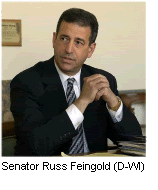Feingold Fights Search And Seizure Of Our Laptops
 Imagine you're on your way home from a family vacation or business trip and some border agent or Transportation Security Administration (TSA) screener stops you or a family member at airport security and insists that you turn on your laptop. They then demand your password so they can browse around and they follow that by confiscating your computer until a later date -- with no charges filed and no reasonable suspicion.
Imagine you're on your way home from a family vacation or business trip and some border agent or Transportation Security Administration (TSA) screener stops you or a family member at airport security and insists that you turn on your laptop. They then demand your password so they can browse around and they follow that by confiscating your computer until a later date -- with no charges filed and no reasonable suspicion.Like air travel isn’t dehumanizing enough, right? And would most of us have any idea how to even respond to such a sudden and arbitrary invasion of our privacy?
That scenario has actually been happening right here in the United States of America and it's the reason Senator Russ Feingold (D-WI) has authored S. 3612, the Travelers' Privacy Protection Act of 2008, which would ensure that American citizens and legal residents returning to the U.S. from overseas are not subject to invasive searches of their laptops or other electronic devices without any suspicion of wrongdoing.
“Most Americans would be shocked to learn that upon their return to the U.S. from traveling abroad, the government could demand the password to their laptop, hold it for as long as it wants, pore over their documents, emails, and photographs, and examine which websites they visited – all without any suggestion of wrong-doing,” Feingold said. "Focusing our limited law enforcement resources on law-abiding Americans who present no basis for suspicion does not make us any safer and is a gross violation of privacy. This bill will bring the government’s practices at the border back in line with the reasonable expectations of law-abiding Americans.”
During the entirety of the Constitution-trashing Bush Administration, the American people have had no greater Congressional defender of their rights than Feingold and, as an aggressive member of both the Senate Judiciary and Intelligence committees, the Wisconsin Senator has always been ahead of the curve in protecting citizens' rights in the face of an unchecked Bush-Cheney-McCain regime.
"There is a compelling and immediate need for this legislation," said Feingold, in introducing his bill on Friday. "Travelers have been forced to wait for hours while customs agents reviewed and sometimes copied the contents of the electronic devices. In some cases, the laptops or cell phones were confiscated, and returned weeks or even months later, with no explanation."
The bill would require all Department of Homeland Security (DHS) agents to have reasonable suspicion before searching the contents of laptops or other electronic equipment carried by U.S. citizens. It would also ban profiling based on travelers' race or ethnicity, allow people detained to witness the process of their laptop being examined, limit the time officials can hold a traveler’s hardware and provide compensation for damage to a traveler’s computer.
And the DHS seems unlikely to cooperate. When Feingold chaired a Senate Judiciary Committee hearing on the issue in June, the DHS refused to send a witness for the hearing and did not comply with the committee's request to produce answers to the questions previously submitted to DHS Secretary Michael Chertoff before the hearing.
The bill is cosponsored by three Democratic Senators, Daniel Akaka of Hawaii, Ron Wyden or Oregon and Washington's Maria Cantwell.
"We need to strike the right balance of keeping Americans safe while protecting their right to privacy. When it comes to homeland security, this Administration time and time again has exceeded the boundaries of current law behind closed doors, without public input, and without oversight," said Cantwell. "The search and seizure of computers, cell phones, digital cameras, and other electronic devices of returning U.S. travelers at airports, even where there is no reasonable suspicion of wrongdoing, is just the most recent example."
The Travelers' Privacy Protection Act is strongly supported by the American Civil Liberties Union as well as business trade groups such as the Association of Corporate Travel Executives (ACTE), which represents the global business travel industry and has members in 82 countries.
“This bill introduces a much higher, and necessary, level of accountability to the laptop examination process,” said ACTE Executive Director Susan Gurley. “It requires the authorities to seek a warrant, which makes it subject to judicial process. It puts an end to the indiscriminate ransacking of data."
And Feingold is betting that -- with so many other outrageous things the Bush administration has done being too nuanced to grasp -- the average American will find it easier to get indignant about being shaken down for no reason and having their personal data examined or confiscated.
Said Feingold on Friday to his Senate colleagues: "Try asking your constituents whether the government has a right to open their laptops, read their documents and e-mails, look at their photographs, and examine the Web sites they have visited -- all without any suspicion of wrongdoing -- and see what they say."
"I think you'll hear the same thing that I have heard: 'Not in the United States of America.'"

















<< Home